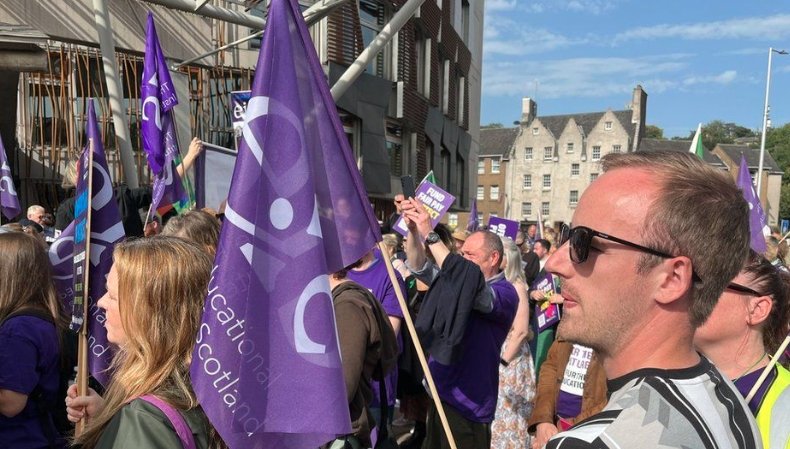College support staff across Scotland are taking strike action over pay, terms and conditions, and threats of compulsory redundancies. The union Unison says the Scottish government must intervene to resolve the dispute and ensure fair treatment for the workers who play a vital role in the education sector.
Why are college support staff striking?
- College support staff are non-teaching staff who work in various roles such as librarians, IT specialists, technicians, administrative and business support workers, cleaners, canteen employees and estate management staff.
- They are represented by Unison, which claims that its members are still waiting for a pay rise that was due more than a year ago.
- Unison also says that college employers have failed to provide a better pay offer and have threatened to make huge job cuts.
- The union argues that college support staff deserve fair pay and conditions, as well as job security, especially during the Covid-19 pandemic.

How widespread is the strike action?
- The strike action involves about 2,000 college support staff across Scotland.
- The action began on Wednesday at Dundee and Angus College, Fife College and Glasgow Clyde College.
- It will continue on different days until Thursday October 12 at various colleges, including West Lothian, North Highland, Moray, Forth Valley, Perth and Inverness.
- The strike action follows a national strike that took place on September 6, which affected all colleges in Scotland.
What is the impact of the strike action?
- The strike action is disrupting the normal functioning of colleges and affecting students and teachers.
- Some classes and services have been cancelled or reduced due to the lack of support staff.
- Some students have expressed their solidarity with the striking workers and joined them on picket lines.
- Some teachers have also voiced their support for the support staff and called for a fair settlement of the dispute.
What is the response of the college employers?
- The college employers are represented by Colleges Scotland Employers’ Association (CSEA), which says it is disappointed by the strike action and claims it has made a reasonable pay offer to Unison.
- CSEA says it has offered a 2% pay increase for 2020-21, backdated to April 2020, and a further 2% increase for 2021-22, effective from April 2021.
- CSEA also says it has agreed to maintain terms and conditions for existing staff and to review them for new staff in consultation with trade unions.
- CSEA says it is open to further dialogue with Unison to reach a resolution.
What is the role of the Scottish government?
- The Scottish government says it is concerned by the impact of the strike action on students and has urged both sides to make every effort to reach a settlement that is fair and affordable.
- The Scottish government says it has allocated £787m in funding for colleges for 2023-24, despite the financial challenges posed by Covid-19. It also says it has increased the college sector’s resource budget by over £168m since 2012-13.
- The Scottish government says it respects the autonomy of individual colleges to make operational decisions on pay and staffing matters, but expects them to be guided by the principles of fair work.
- The Scottish government says it will continue to monitor the situation and engage with both parties as appropriate.
What are the prospects for a resolution?
- Unison representatives met with Graeme Dey MSP, the minister for higher and further education, on Thursday at St Andrew’s House in Edinburgh, to demand his intervention in ending the strikes.
- Unison said it hoped that the meeting would lead to a breakthrough in the negotiations and avert further disruption to colleges and students.
- Unison also said it was willing to suspend the strike action if CSEA made a satisfactory pay offer and withdrew the threats of compulsory redundancies.
- However, there was no immediate indication of any progress or agreement after the meeting. Unison said it would consult its members on any new developments before taking any further action.


















